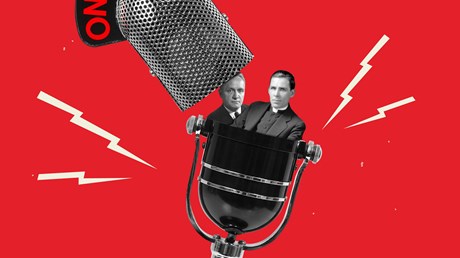How Fulton J. Sheen and Walter A. Maier unlocked the evangelistic power of the airwaves.

In the 1930s and 1940s, two of the most widely heard preachers in America were also two of the most unlikely candidates for such fame. Fulton Sheen and Walter Maier were both sons of immigrants, both seminary professors specializing in ancient languages, and both from historically oppressed religious traditions. But through the power of radio—which was then a novel mass medium—they reached millions of listeners and ultimately reshaped the trajectory of conservative religion in America.
Their story is told in Kirk Farney’s compulsively readable dual biography, Ministers of a New Medium: Broadcasting Theology in the Radio Ministries of Fulton J. Sheen and Walter A. Maier. Maier, born to German immigrants, showed early academic promise and attended Concordia Seminary (the flagship seminary of the Lutheran Church—Missouri Synod) before completing a PhD at Harvard Divinity School. Being part of a still largely German-speaking Lutheran church was an obstacle given public suspicion towards German-American immigrants during and after World War I. Maier, seeking to establish his patriotic bona fides and to “register his disapproval of the Prussian military clique,” joined the US Army as a chaplain. Yet he promptly pushed the limits of official toleration by ministering to German prisoners of war.
After the war, Maier joined the faculty at Concordia Seminary, where in 1924 he convinced the school to apply for a radio license, financing station KFUO with money fundraised from faculty, students, and alumni. Maier’s early adoption of radio as a means of outreach quickly paid off. Within a few years, his show, The Lutheran Hour, aired on stations nationwide, first on the CBS network and then on ...
from Christianity Today Magazine
Umn ministry


.gif)

.gif)
.gif)
